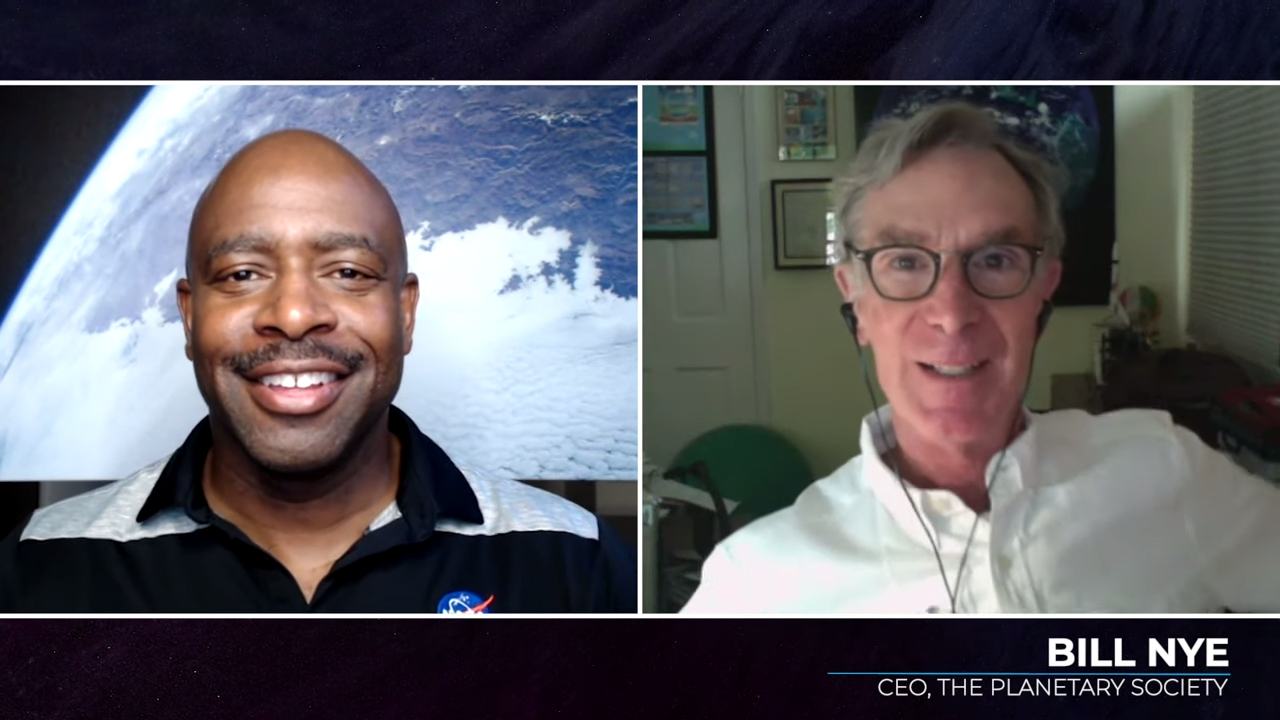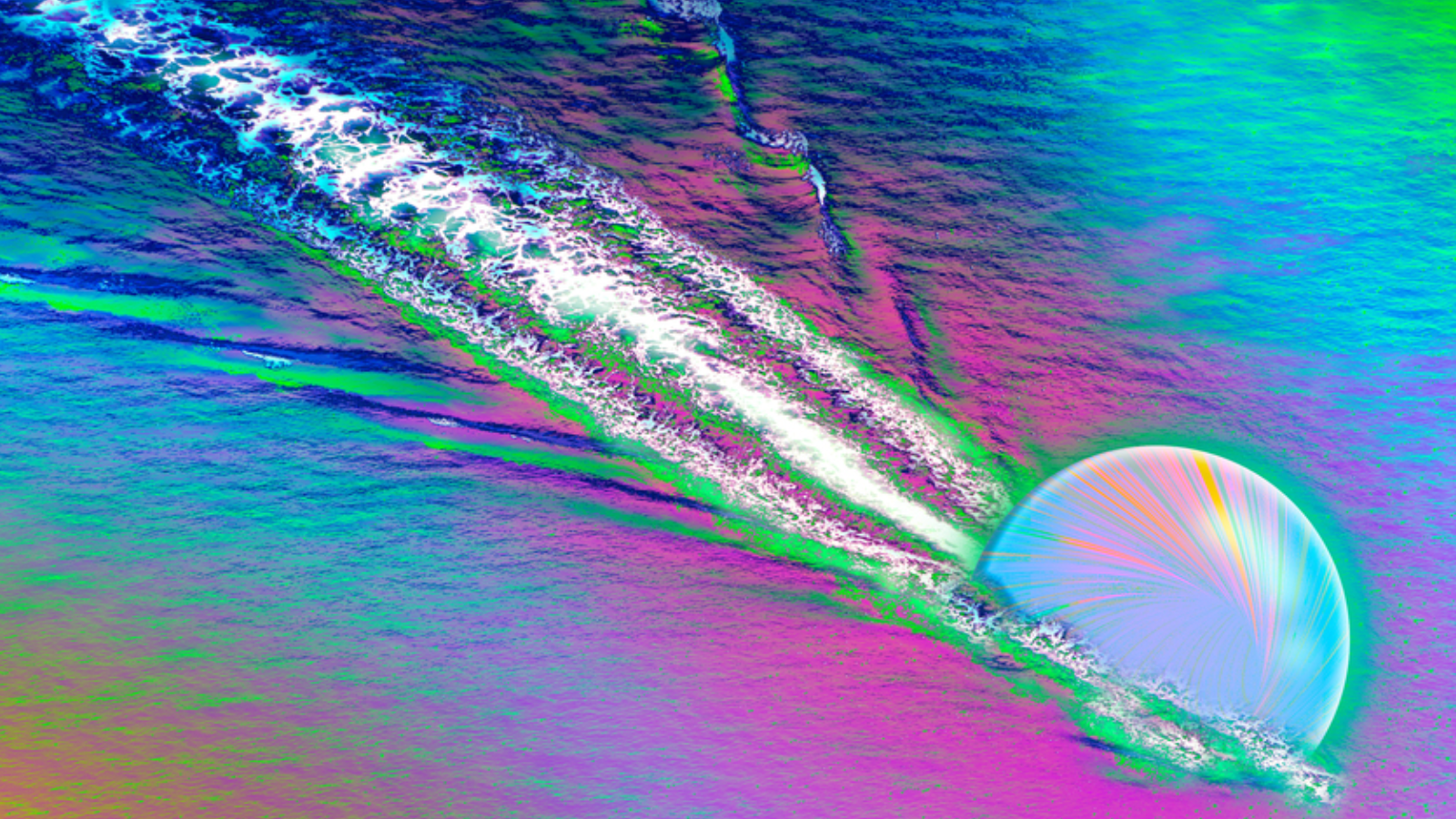Bill Nye and former astronaut Leland Melvin talk racial injustice and space exploration (video)
Leland Melvin says there was a night when he could have wrongfully been put in jail, stopping any chance of him flying twice in space as a NASA astronaut later in his career.
In conversation with Bill Nye, president of The Planetary Society, the Black retired astronaut recalled being pulled over by a White police officer during Leland's senior year — graduation night, he said.
"I was in a car with my girlfriend after graduation and a police officer rolls upon us," Melvin recalled in an interview on YouTube, released Friday (June 12).
"What were you doing in the car?" Nye asked.
"Making out, talking, whatever," Melvin said, laughing. Turning serious, he continued: "He grabs her out of the car — he was a state trooper — he puts her in his car and he tries to convince her that I was raping her, because he wanted me to go to jail."
Related: How astronaut Leland Melvin went from the NFL to space
Melvin's girlfriend stood firm with the police officer, Melvin said, saying she loved Melvin and that he was about to go to college on a football scholarship. The police officer pressured her further, threatening to take her to jail and to force her parents to come to the station to retrieve her. When the girlfriend still refused to relent, Melvin said, the officer gave up and let the couple go.
Breaking space news, the latest updates on rocket launches, skywatching events and more!
"The crazy thing is, I think about you and I. We wouldn't have this conversation right now, because I would have been in the prison system," Melvin said to Nye. "Once you get in the prison system, it's sometimes hard to get out of that system."
Melvin said he was lucky that didn't happen. He continued to play football in college, then was selected by the Detroit Lions in the 1986 NFL draft as a wide receiver. He pulled a hamstring during training camp and was released by the team. The following spring, he reported to the Dallas Cowboys, but pulled the hamstring again and stopped playing professional football.
Next, Melvin — who once created "fire and brimstone" in the household, he said, when using a chemistry experiment as a kid — went to NASA. He worked on engineering projects such as the X-33 plane, then became an astronaut in 1998. Melvin flew twice in space during space shuttle missions STS-122 (in 2008) and STS-129 (in 2009), logging 565 hours before retiring.
"It changes you, Bill," Melvin said of spaceflight. "It makes you feel so connected with the world, when you start seeing the blue dot behind you — getting smaller — and then you get there [to space] and go around it every 90 minutes. You're connected with all of civilization."
Melvin then described his feelings of connection with Black people who made it in the news due to run-ins with the police. Like them, Melvin said, he got "the talk" as a child about how to work with police officers as a Black person.
He said growing up, he had few run-ins with the law. This may be in part, he said, because his family was lucky in being able to own a home in a good neighborhood, thanks to a sympathetic Quaker who struck a deal with Melvin's father to buy the house with owner financing. This got around the racist "redlining" practice that used to limit Black owners in certain neighborhoods, before it was outlawed.
"I am not the de facto spokesperson for all Black people, okay?" Melvin said as he began talking about events in the news. But he added that he has had experiences "similar to other people who were not as fortunate as I."
Melvin said there are at least three recent experiences that are weighing upon the Black community now.
One is Amy Cooper, who Melvin said was "weaponizing her voice as a white woman" for calling the police on the coincidentally named Christian Cooper (no relation) — a Black man who was bird-watching in New York City's Central Park in May. "In that moment, you could get a police officer who doesn't like people with lots of melanin in their system, and they're gone," Melvin said.
The second incident was the death of Breonna Taylor, a Black emergency medical technician killed in March by Louisville, Kentucky police officers who forced their way into her apartment under a search warrant. The search was for two people who were already in police custody, including one who had a prior relationship to Taylor.
The third was the death of George Floyd, who was killed May 25 when the now-former Minneapolis police officer Derek Chauvin pressed his knee on Floyd's neck for 8 minutes and 46 seconds while other officers looked on. Floyd's pleas for help were captured on video. Chauvin was arrested and charged with third-degree murder and second-degree manslaughter. Protests erupted across the world in the wake of Floyd's death.
"Listening to him, Bill, I started crying," Melvin said. "I heard him calling for his mother. He was calling for his mom. That could have been me."
Melvin acknowledged other barriers he faced in his life — microaggressions, implicit biases and the terror he once felt when a police officer pulled him over for speeding. Melvin said he is an optimist, because going to space two times means "there's got to be hope" for Black people like him. That said, there are systemic problems that need to be addressed, he told Nye.
Melvin called for changes to policing and unions that represent police, citing too many instances of officers with complaints being reinstated or reassigned to another force. He called for more diversity in organizations more generally. Nye said of the Planetary Society, "We're diverse-ish … we're a small organization, but we're really going to work on it."
Melvin called on everyone to think hard on their own implicit biases, whether it be about racism or sexism or some other bias. If you are in a leadership position, Melvin added, it is up to you to "set the tone for what's expected," including what rules are put in place for those who engage in discrimination. (Later in the interview, he added there are instances of Black people being told not to wear braids in the workplace because it's not "White enough.")
Melvin pointed to the historical roots of discrimination in the United States, such as the slavery practices that dominated the Southern economy for generations, or the Constitutional writers that mostly owned slaves themselves while writing their lofty ideals about freedom or equality.
This older discrimination still affects generations after, Melvin said; for example, a little girl once wrote Melvin asking if Jim Crow laws hadn't been around at the time that the Black mathematician Katherine Johnson was calculating trajectories for astronaut missions in space, "would we have got there faster."
Melvin himself wasn't immune to generational problems, he said, as he remembers from childhood being inspired by Nichelle Nichols' presence on "Star Trek: The Original Series" because she was Black and looked like him. The Apollo astronauts who walked on the moon, he added, were white.
"Talent is in every single zip code," Melvin said at one point in the interview. "It just depends on the opportunity, the nurturing and the belief a person has that they can rise above certain things."
- Astronaut Leland Melvin celebrated for work championing women
- In 'Truth Behind the Moon Landing,' Leland Melvin debunks conspiracy theories
- NASA astronaut Victor Glover explains why we can't just stick to space
Follow Elizabeth Howell on Twitter @howellspace. Follow us on Twitter @Spacedotcom and on Facebook.
OFFER: Save 45% on 'All About Space' 'How it Works' and 'All About History'!
For a limited time, you can take out a digital subscription to any of our best-selling science magazines for just $2.38 per month, or 45% off the standard price for the first three months.

Elizabeth Howell (she/her), Ph.D., was a staff writer in the spaceflight channel between 2022 and 2024 specializing in Canadian space news. She was contributing writer for Space.com for 10 years from 2012 to 2024. Elizabeth's reporting includes multiple exclusives with the White House, leading world coverage about a lost-and-found space tomato on the International Space Station, witnessing five human spaceflight launches on two continents, flying parabolic, working inside a spacesuit, and participating in a simulated Mars mission. Her latest book, "Why Am I Taller?" (ECW Press, 2022) is co-written with astronaut Dave Williams.



